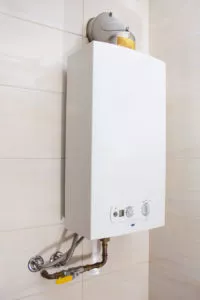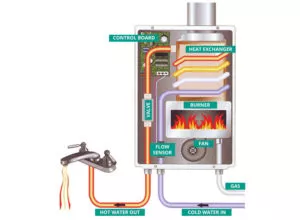
You depend on your water heater for various daily tasks, including cooking, laundry, and bathing. The frequent use of your water heater directly affects your monthly utility bills.
Your water heater can account for almost 20% of the energy used for a home with a tank water heater. If your water heater is taking longer to heat the water, that means you’ll spend more on your monthly energy bills.
[cta_button]
How To Know If Your Water Heater Is Increasing Your Energy Usage
Your water heater uses energy to generate heat to warm the water needed for your Pennsylvania home and daily tasks. The amount of hot water used for bathing, laundry, cooking, and cleaning will directly affect the amount of energy used.
These major factors contribute to the amount of energy your water heater uses:
- The age of your system: If your water heater is 10–15 years old, its efficiency may have declined, causing it to use more energy to produce hot water.
- The energy efficiency rating of your water heater: Water heaters are given a Uniform Energy Factor (UEF) rating. This rating establishes the system’s energy efficiency. It includes estimated yearly energy cost, gallons per minute rating, usage bin, and estimated annual energy use.
- The size of your water heater: If it’s too small for your household heating demands, it will cause the water heater to work harder and use more energy.
If you’re looking to decrease your monthly energy use from your water heater and lower your utility bills, a new energy-efficient water heater is a sound investment.
How To Reduce Energy Usage of Your Water Heater
If you’re not ready to upgrade your water heater, there are a few steps you can take to help lower your water heater’s energy usage:
- Thermostat temperature: Turn the temperature on the water heater thermostat down to 120 degrees. By turning down the temperature from 140 degrees to 120 degrees, you can save between 6% and 10% on your energy bill.
- Use cold water when doing laundry: Only use the hot water cycle on your necessary laundry loads.
- Only run full loads in your dishwasher: Most dishwashers use a large amount of hot water. By only running the dishwasher when it’s full, you lower the number of cycles it completes, your hot water usage, and your energy bill.
- Insulate the tank: Properly insulating the storage tank will reduce heat loss. Make sure you follow the manufacturer’s specifications when insulating your tank. It’s best to consult a professional plumbing company for this.
Implementing a few strategies to use less hot water can help you see monthly savings on your energy bill.
Energy-Efficient Water Heaters & Tankless Systems

Like many major appliances, water heaters are built to last for years. Over time, however, they begin to lose their efficiency. When the efficiency of your water heater drops, your energy bill will rise.
Installing a new energy-efficient water heater or tankless water heater is the best investment for long-term savings.
Tankless water heaters are highly efficient and can help save Pennsylvania homeowners an average of 24–34% on energy costs. They don’t need to keep a standing supply of hot water ready and only heat water on demand. The average life span of a tankless water heater is 20–25 years, versus a tank system lasting an average of 10–15 years.
With a new tankless water heater, you’ll have the benefits of an endless hot water supply, lower utility bills, and a long-lasting system.
Install an Energy-Efficient Water Heater With Andreas Plumbing, Heating & Air Conditioning
Ready to upgrade your old water heater to a new, energy-efficient model? Choose Andreas Plumbing, Heating & Air Conditioning for expert installation. Our professionals will help you choose the best water heater for your home and budget.
As a fourth-generation, family-owned business, we understand how Eastern Pennsylvanians value quality. That’s why we deliver honest work and outstanding service. Our team will treat you like family.
[cta_shortcode]
Discuss your water heater installation needs with our experts. Contact us today at [site_info_phone_number].
